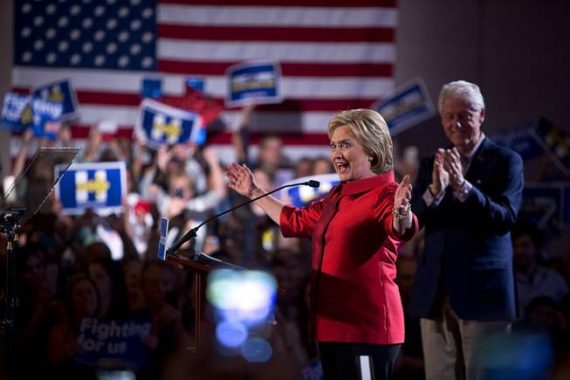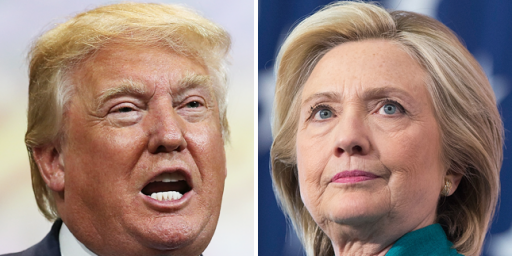Hillary Clinton Sweeps Four Of Five Mid-Atlantic States, Edges Closer To Delegate Majority
Another big night for Hillary Clinton, and more bad news for Bernie Sanders.
Hillary Clinton walked away from yesterday’s Mid-Atlantic primaries winning four out of five states and putting herself close enough to winning an outright majority of delegates to put the Democratic nomination well within reach:
PHILADELPHIA — Hillary Clinton all but secured the Democratic nomination Tuesday after a long and bruising primary fight against rival Sen. Bernie Sanders, scoring decisive victories in four of five East Coast states to cast ballots.
In the last big day of multiple contests before Democrats conclude their primary voting in June, Clinton won Pennsylvania, Maryland, Connecticut and Delaware, and Sanders won in tiny Rhode Island, the only state where independents could vote in the Democratic contest.
Overall, Sanders picked up a fraction of the delegates awarded to Clinton.
While not mathematically eliminated, the liberal senator from Vermont, whose outsider campaign captured a current of Democratic discontent, remains far behind and now faces nearly impossible odds as the nominating contest draws to a close.
Clinton all but declared victory over Sanders on Tuesday, turning her sights to the Democratic National Convention, to be held here in July, and a possible general election race against Republican Donald Trump.
Before a boisterous crowd of 1,300 in Philadelphia, Clinton asked Democrats to imagine a more hopeful, compassionate country “where love trumps hate.”
Speaking to Sanders supporters, Clinton said she intends to unify the party. She appealed to their shared values, including reducing income inequality, college affordability and universal health coverage.
“Our campaign is about restoring people’s confidence in our ability to solve problems together,” Clinton said. “That’s why we’re setting bold, progressive goals backed up by real plans.
“After all, that is how progress is made,” she said. “We have to be both dreamers and doers.”
Tuesday’s performance allows Clinton to reposition her campaign for the general election fight against Republicans in ways that have been difficult to do while fending off Sanders’s persistent, well-funded and remarkably successful challenge.
Her speech Tuesday included an appeal to moderate independent voters, who Democrats believe may be looking for a home in a general election if the Republican nominee is Trump.
“If you are a Democrat, an independent or a thoughtful Republican, you know their approach is not going to build an America where we increase opportunity or decrease inequality,” Clinton said. “So instead of us letting them take us backwards we want America to be in the future business.”
Trump, declaring victory Tuesday, repeated his new epithet for Clinton: “Crooked Hillary.” will not be a good president,” he said. “She doesn’t have the strength. She doesn’t have the stamina.”
He added: “If Hillary Clinton were a man, I don’t think she’d get 5 percent of the vote.”
Sanders has pledged to remain in the race, but in a statement Tuesday night, he suggested motives besides winning the nomination, such as shaping the Democratic party’s platform, that would keep him in the campaign.
“The people in every state in this country should have the right to determine who they want as president and what the agenda of the Democratic Party should be,” Sanders said. “That’s why we are in this race until the last vote is cast.”
He listed several issues he would like to see in the Democratic platform, including a $15 minimum wage and the kind of single-payer health-care system that Clinton has not embraced.
Sanders had rallied early in Huntington, W.Va., in a state that holds its primary in two weeks.
“This campaign is not just about electing a president. It is about transforming our nation,” Sanders told a crowd of 6,400.
Clinton’s big victory in New York last week appeared to give her a boost in Pennsylvania, the largest state in play Tuesday, with 189 delegates. Sanders aides once thought he could win there because it shares demographic and economic characteristics with majority-white Midwestern states he had captured earlier.
Clinton has routinely outpaced Sanders among registered Democrats, while Sanders — who has run as an independent in his congressional races — cleans up with unaffiliated voters.
Tad Devine, Sanders’s senior strategist, said the candidate and his top aides plan to talk Wednesday about how his path to the nomination has been affected by Tuesday’s results, but he said he sees no scenario in which Sanders drops out.
“Our path to the nomination was never narrower than the day I announced my candidacy. I will not stop fighting for an America where no one who works 40 hours a week lives in poverty, where health care is a right for all Americans, where kids of all backgrounds can go to college without crushing debt, where there is no bank too big to fail, no banker too powerful to jail, and we’ve reclaimed our democracy from the billionaire class.”
Sanders is poised to perform well in Indiana and has said he expects to outright win other states voting soon, including West Virginia, Kentucky and Oregon. But there are no big prizes on the Democratic calendar in May that would allow him to capture a large number of delegates.
As with Donald Trump, Clinton outperformed her polling in the four states that she won last night, winning 55.6% of the vote in Pennsylvania, 63% of the vote in Maryland, 51.7% of the vote in Connecticut, and 59.8% of the vote in Delaware. The one exception of the night on the Democratic side was Rhode Island, but as I mentioned yesterday that was one of the states where polling was limited, and at least one poll had shown Senator Sanders with a lead in the state so a win on his part there isn’t entirely surprising. In any case, thanks to the manner in which Democrats allocate delegates Sanders’ win only garnered him two more delegates than Hillary Clinton, which will do hardly anything to cut into the former Secretary of State’s formidable lead in the delegate count. More importantly, what last night showed is that Clinton’s campaign seems to have cleared recovered from the body blows it seemed to have taken when Bernie Sanders was winning caucuses out West quite easily. This is important because, going forward, the map is much more favorable to Clinton than it is to Sanders, as is the delegate math.
Speaking of which, a look at the delegate numbers in the wake of Hillary Clinton’s largely victorious night makes clear that the Democratic race is, effectively over and that Bernie Sanders is simply defying reality if he continues to maintain that he has any chance at all of winning the nomination. Of the 384 delegates that were up for grabs last night, Clinton has clearly won at least 204, while Senator Sanders managed to pick up just 146, putting him even further behind in the race for delegates while Clinton lies just short of the finish line. If Superdelegates are included in the count, and at this point there’s no reason they shouldn’t be, Clinton has 2,151 delegates in her corner, putting her just 231 delegates short of the majority she needs to claim in the nomination on the first ballot. This means she would need to win just 20.625% of the outstanding pledged delegates in order to win the nomination. Sanders, on the other hand, currently has a total of 1,338 pledged delegates and Superdelegates and would need to win 93% of the outstanding delegates to win the nomination. In other words, while he isn’t mathematically eliminated yet, Sanders is on the verge of being so and is at least at the point where no rational person can believe that it’s likely that he will win the nomination. At this point, the ball is completely in his court, and he can either continue with a doomed campaign or begin the process of moving aside and letting his opponent prepare for the General Election.







Clinton won 58% of the popular vote in the primaries held since the beginning of last week. This is the sort of result that is usually referred to as a “landslide”, but apparently it makes no difference because Bernie Sanders won one state out of the last six. And so it goes.
Read an interesting FB post the other day responding to pro-Sanders accusation that Democrats were “keeping Independents down” and that NY was “stolen”; namely, we shouldn’t be referring to them as “independents” (little I or not) but rather as the “unenrolled” or “unaffiliated”. That the difference between an open and closed primary is putting an internal issue up for public voting or for members only. A large number of people switched their registration to Independent in the last decade or so in protest or just to not be publicly affiliated with a party they may still privately sympathize with. Except…..it’s a party in and of itself, not a “neutral” status. By doing that, you knowingly forfeited the right to make party decisions if the party decides it’s members only. In practical terms, it’s like renouncing your citizenship to protest government action but still expecting to keep all your civil rights and privileges.
That Sanders does well amongst the unenrolled but not with the registered has hurt him greatly in his campaign. It’s not something he can recover from; it’s over.
@KM:
They’ve always been sort of a constituency of the disaffected, sitting around in a huff because they can’t get their way.
I was certain when I voted for Sanders in February (early voting period in TX) that Clinton would ultimately win the nomination. It should have been obvious to almost anyone that the Democratic primary would turn out this way in the aggregate.
I don’t think Sanders should drop out. Everyone interested in the outcome of the primary should have their chance to vote for either one of them, as their conscious dictates. However, I think it is now past time for Sanders to tone down his anti-Clinton rhetoric. She is going to be the nominee unless something Black Swan-ish happens, and people need a few months to settle down internally and get ready to start electing Democrats up and down the ballot in November.
@Gromitt Gunn: I agree with you regarding toning down the rhetoric at this stage, but does it seem to you (or anyone else) that the Sanders campaign seems to be, in my grandmother’s lovely phrase, losing the run of itself? Between Jane Sanders and equating releasing their taxes to HRC’s Wall Street transcripts (really, Sanders campaign? really?) and the odd “You’ll have to win my people over!” phrasing of that one speech, I was left shaking my head.
@Blue Galangal: I truly have not been paying as much attention as I normally would to such things, as my work / life balance has been tilted much to heavily towards “work” for the past month, and every time I remove one thing from the top of the To Do List, three more get added to the bottom. So, for that reason, I don’t have an informed opinion on the matter.
@Gromitt Gunn:
Except that’s never how it works for the later states. People in Rhode Island rarely get the chance to vote for as many choices as Iowa. I can certainly sympathize with the frustration of getting the reduced menu of options (my state is mid-schedule) but that’s simply a function of the process.
I would agree he should stay on the ballot to allow for choice but cease campaigning or raising funds. Campaigning costs time and money; Sanders is still raising money even as we speak. Surely your conscious would feel just as good, if not better, knowing that money could be spent on worthwhile causes like feeding the poor instead a futile gesture? Why is he still out giving speeches, making stops? He’s acting like he’s still a desperate but viable candidate, not just a conscious vote.
Sanders staying in the race isn’t because he thinks he’ll win. I can only assume that it’s to force Hillary to keep pretending that she gives a crap about the progressive wing of her party for an extra couple months. Most liberals know that everything she’s saying right night is BS rhetoric she’s spewing because she has to protect her left flank. Once Sanders is out, she’ll snap right back to the centrist war hawk that she’s always been and the progressives will be left in the cold again. At least if he makes her keep this up until July, it will be harder for her to do the full snap-back without looking disingenuous.
@Blue Galangal: I agree with you. It’s flat-out weird to watch. Equating the release of a candidate’s taxes–a standard for YEARS–with the speech transcripts was strange. But the “you’ll have to win my voters over on your own” was bizarre. It’s petty and in marked contrast to Clinton’s pivot in 2008 from candidate to surrogate. He really doesn’t seem to appreciate what it means to run under a party banner–he did so willingly, presumably because it gave him the best chance of having his issues heard. They have been–loud and clear–and yet he’s complained about the process and now is doing the equivalent of shrugging and saying “I’m done here, why should I help you?” It’s off-putting.
Part of the problem of Sanders´ campaign is that it diverts money and activists that could have been used to elect Donna Edwards and Joe Sestak to the US Senate. Both of them lost. Sanders can´t be president, but Donna Edwards and Joe Sestak could be easily elected to the US Senate.
/pedantry ON
It’s not a “sweep” unless you win all of the contests in the set.
/pedantry OFF
@Andre Kenji:
Edwards more or less killed herself by going negative against Van Hollen. That having been said, the Maryland Democratic Party didn’t want her, she’s delivered a lackluster performance in the House and the voters of Maryland soundly rejected her.